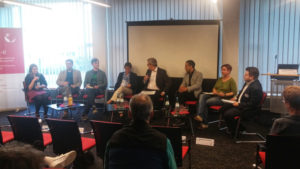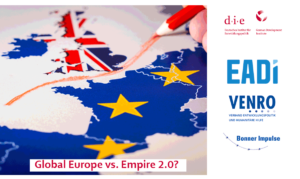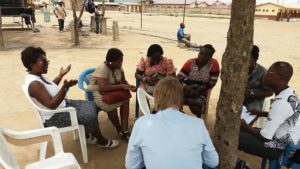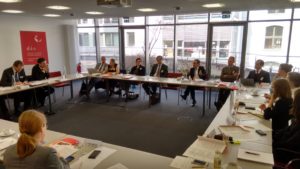 Against the background of the elections to the European Parliament on 26 May 2019, the German Development Institute / Deutsches Institut für Entwicklungspolitik (DIE) in cooperation with the SÜDWIND Institute organised a panel discussion with representatives from politics, science and civil society.
Against the background of the elections to the European Parliament on 26 May 2019, the German Development Institute / Deutsches Institut für Entwicklungspolitik (DIE) in cooperation with the SÜDWIND Institute organised a panel discussion with representatives from politics, science and civil society.
With the elections, European citizens are called upon to have a say in the role that Europe plays in global sustainable development. While the European Union (EU) had played a pioneering role in the formulation of the Sustainable Development Goals (SDGs), it is now clear that the policies of the EU and its member states often run counter to the development goals instead of promoting them. What course should be set for a fairer and human rights-based economy? Which strategy is needed to steer private investments in the sense of the SDGs? How can the EU live up to its responsibility for climate justice? These and other questions were discussed with several candidates for the European Parliament during the event.
After a welcoming address by Stephan Klingebiel (DIE) and Martina Schaub (SÜDWIND e.V.), Pedro Morazán (SÜDWIND e.V.) introduced the topic of the evening with a lecture on the development policy responsibility of the EU. The opening statements of the participants were followed by a lively discussion on the podium as well as with the guests of the event. It became clear that in view of its international importance and the impact of its decisions, in particular on developing countries, the EU needs to pursue a responsible policy in order to meet global challenges. The participants agreed that the forthcoming European elections will guide the way for a just and sustainable global future.

 The United Kingdom is one of the four principal actors of European development cooperation. Thus, Brexit will have significant consequences for the future of Europe’s global role. This situation was the backdrop to a panel discussion of the series Bonner Impulse on 27 February, which focused on the future relationship between the UK and the EU in matters of foreign and development policy. The event series, which is co-hosted by German Development Institute / Deutsches Institut für Entwicklungspolitik (DIE), the European Association of Development Research and Training Institutes (EADI) and the umbrella organisation of development and humanitarian aid NGOs in Germany VENRO, regularly invites experts from politics, academia and civil society to discuss sustainable European development policy. That Wednesday evening, around 100 guests did attend the discussion that took place in the auditorium of the Kunstmuseum Bonn.
The United Kingdom is one of the four principal actors of European development cooperation. Thus, Brexit will have significant consequences for the future of Europe’s global role. This situation was the backdrop to a panel discussion of the series Bonner Impulse on 27 February, which focused on the future relationship between the UK and the EU in matters of foreign and development policy. The event series, which is co-hosted by German Development Institute / Deutsches Institut für Entwicklungspolitik (DIE), the European Association of Development Research and Training Institutes (EADI) and the umbrella organisation of development and humanitarian aid NGOs in Germany VENRO, regularly invites experts from politics, academia and civil society to discuss sustainable European development policy. That Wednesday evening, around 100 guests did attend the discussion that took place in the auditorium of the Kunstmuseum Bonn.
 The Roundtable “Investment Facility for Sustainable Development”, organized by DIE on 19 March 2019 in Berlin, brought together senior experts from governments, international organizations and academia. The aim was to discuss options on how current discussions on an international framework for investment facilitation can better promote sustainable development. Investment facilitation is a new issue on the agenda of the World Trade Organization (WTO) and developing and emerging countries in particular are driving this discussion. Investment Facilitation aims to make national investment systems more transparent, consistent and predictable.
The Roundtable “Investment Facility for Sustainable Development”, organized by DIE on 19 March 2019 in Berlin, brought together senior experts from governments, international organizations and academia. The aim was to discuss options on how current discussions on an international framework for investment facilitation can better promote sustainable development. Investment facilitation is a new issue on the agenda of the World Trade Organization (WTO) and developing and emerging countries in particular are driving this discussion. Investment Facilitation aims to make national investment systems more transparent, consistent and predictable.